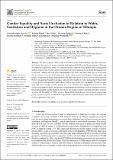Gender Equality and Social Inclusion in Relation to Water, Sanitation and Hygiene in the Oromia Region of Ethiopia
View/
Publication Date
2021-04-17Type
Article, Journalviews
downloads
Metadata
Show full item recordCitation
Assefa, G.M.; Sherif, S.; Sluijs, J.; Kuijpers, M.; Chaka, T.; Solomon, A.; Hailu, Y.; Muluneh, M.D. Gender Equality and Social Inclusion in Relation toWater, Sanitation and Hygiene in the Oromia Region of Ethiopia. Int. J. Environ. Res. Public Health 2021, 18, 4281. https://doi.org/10.3390/ ijerph18084281
Abstract/
The main purpose of the study was to deepen the understanding of gender and social inclusion in the context of water, sanitation, and hygiene (WASH) in the Oromia region of Ethiopia. An explorative qualitative study was conducted in three districts of the Oromia region using gender analysis frameworks. Twenty-one key informant interviews and nine focus group discussions were conducted. Findings showed 52% of households in the study area have basic service level water, 29% have basic service level sanitation, and 14% have basic service level hygiene. Women, girls, and people living with disability disproportionately experience poor access to quality WASH services. Women and girls participate in unequal domestic labor related to water management which often exposes them to discrimination and violence such as rape, abduction, and assault. Overall, women, girls, and other socially excluded groups are rarely consulted and engaged by local actors. This results in incongruent policy and political commitment which limits action at the grassroots level. Integrating gender equality and inclusion efforts into local governance agendas can help to increase access to and the quality of WASH services. These efforts must advocate for moving beyond gender parity to promote gender transformative approaches and inclusion to realize better WASH services for the communities they serve.
Further Details
Copyright: © 2021 by the authors. Licensee MDPI, Basel, Switzerland. This article is an open access article distributed under the terms and conditions of the Creative Commons Attribution (CC BY) license (https:// creativecommons.org/licenses/by/ 4.0/).
Publisher
MDPICollections
- General - GEN [367]

